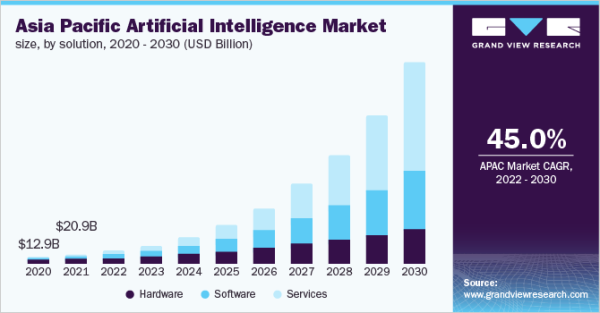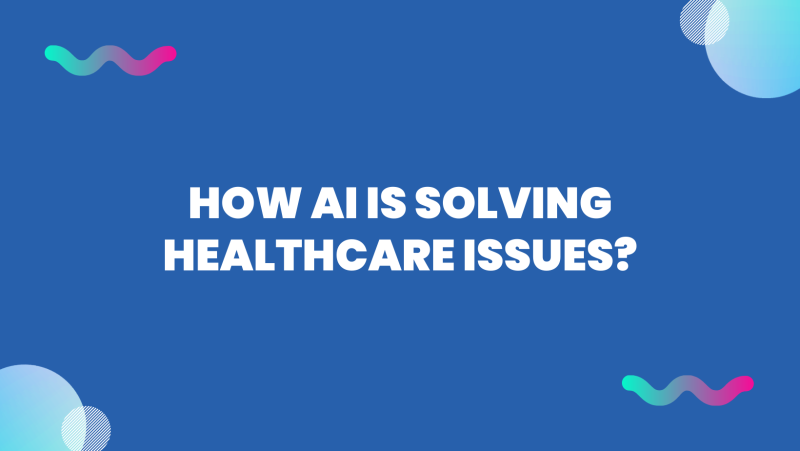Over the last few decades, humans have progressed in many fields but the achievement in the technology sector especially, the innovation of AI (Artificial Intelligence) is phenomenal.
John Mccarthy is known as the Father of Artificial Intelligence once said that "If it takes 200 years to achieve artificial intelligence and then finally there's a textbook that explains how it's done, the hardest part of that textbook to write will be a part that explains why people didn't think of it 200 years ago."
Coming to the point, AI is positively impacting every industry and every human being, and the game will keep going on and on.
Why is AI important?
AI is the process of educating computer models using complex and large data sets.
It reduces human efforts and makes it easy for machines to learn through experiences just like humans.
As a result, industry such as healthcare is massively adopting AI to improve patient care.
For instance, it helps us greatly by enabling it at a social distance and detecting covid-19 devices during pandemics.
However, AI is essential for every sector of the economy and every human being because it has the potential to overcome the factors affecting the future by reducing human efforts.
An estimate says that the usage of AI is going to increase by around 146% in the upcoming years.
Issues in the healthcare sector: Explore in detail
Behind the screen, every industry is facing issues, healthcare is one of the most important of them.
Let's identify the difficulties in the healthcare sector.
#1. Implementing healthcare technology:
Healthcare without technology is like a car without a machine.
Currently, healthcare is facing problems in giving the right treatment to patients, because of the inefficient use of technology in healthcare.
Many healthcare companies are not using technology like AI, and IoT in healthcare. Due to that barriers are occurring in healthcare.
However, doctors are facing hurdles in understanding the exact diseases of patients, and in other words, patients do not get the right treatment at the right time.
#2. Cyber security:
Cybercrime is the only factor that is affecting every industry, and the healthcare sector is the prior target of that.
As per the report, "In 2020 and 2021, there were 168 cyber attacks carried out in over 1,763 clinics, hospitals, and health care organizations in the US."
Hospitals and clinics face issues in handling patient data and many other administrative and high confidential information.
Meanwhile, keeping secure data has become overwhelming for hospitals and clinics that are not adopting technology.
#3 Increase in cost of healthcare:
The rising cost of healthcare is becoming the biggest challenge for the healthcare sector. Doctors are charging high fees for check-ups and treatment. This became a burden for middle & poor-class people to manage financial stability.
Especially, patients with chronic diseases face a lot of financial issues due to over-budget healthcare costs.
They know that taking proper treatment is necessary for chronic patients, but due to high treatment costs, patients can't afford it.
#4 Rising cost of pharmaceuticals:
The rise in pharmaceutical costs is the major factor affecting both healthcare enterprises and patients.
For instance,
- "The drug price has seen a growth of 7.5 percent between 2019 and 2020”
- “11% (1,106 drugs) saw increases that were higher than inflation but less than 7.5 percent”
- “9% (285 drugs) saw increases that were lower than inflation
- “41% (1,385 drugs) saw price decreases"
Many stakeholders play a key role in determining healthcare costs that also include pharmaceuticals.
#5 Trouble in handling administration:
Managing administration of healthcare is becoming overwhelming for healthcare enterprises.
For instance, recruiting staff, maintaining proper order, and handling day-to-day operations.
This needs a lot of human effort and due to a shortage of staff, this becomes difficult for healthcare enterprises to manage administration.
Game-changing solution of AI in the healthcare sector
AI can be the problem solver of the healthcare industry because it has the potential to overcome those challenges.
The inception of AI in healthcare will help both healthcare enterprises and patients.
After identifying the issues, let's talk about the solution that AI can bring to the healthcare sector.
- AI increases the ability of doctors to understand the exact disease of patients and helps to provide better treatment
- It helps in chronic care management, where patients need regular treatment by allowing patients to share the real-time health condition using the AI and IoT-enabled app.
- AI can help detect viruses and prioritize threats, and take automated remediation actions against cybercrime
- AI can help improve the process of manufacturing drugs by providing biomedical data like the number of testing samples and identifying the right drug that has a higher success rate
- It also reduces human efforts and helps in managing administrative tasks, and avoids paying salaries to staff.
Why will AI be successful in the upcoming years?
AI has brought a drastic change in solving healthcare issues. There is no doubt that AI will be successful in the future.
AI is expected to replace manual efforts and transform jobs and generate new ones. Humans will have the opportunity to concentrate on the more difficult tasks, while AI technology handles repetitive jobs as the way we work is predicted to change.
As per the report "The size of the worldwide artificial intelligence industry, which was estimated to be worth USD 93.5 billion in 2021, is anticipated to increase at a CAGR of 38.1 percent from 2022 to 2030."

Today, many scientists are researching and understanding the human mind through AI. Many tests are conducted but no one is successful yet.
Conclusion:
Investing in healthcare IT solutions like healthcare app development, healthcare software development, and many more have been proven to reduce operational costs.
It will boost the productivity of healthcare, and help to provide better care solutions to the patients. Especially for chronic care patients.
As a result, healthcare enterprises are adopting trending solutions like telehealth, EMR & EHR, and generalized healthcare to overcome the challenges of healthcare.

